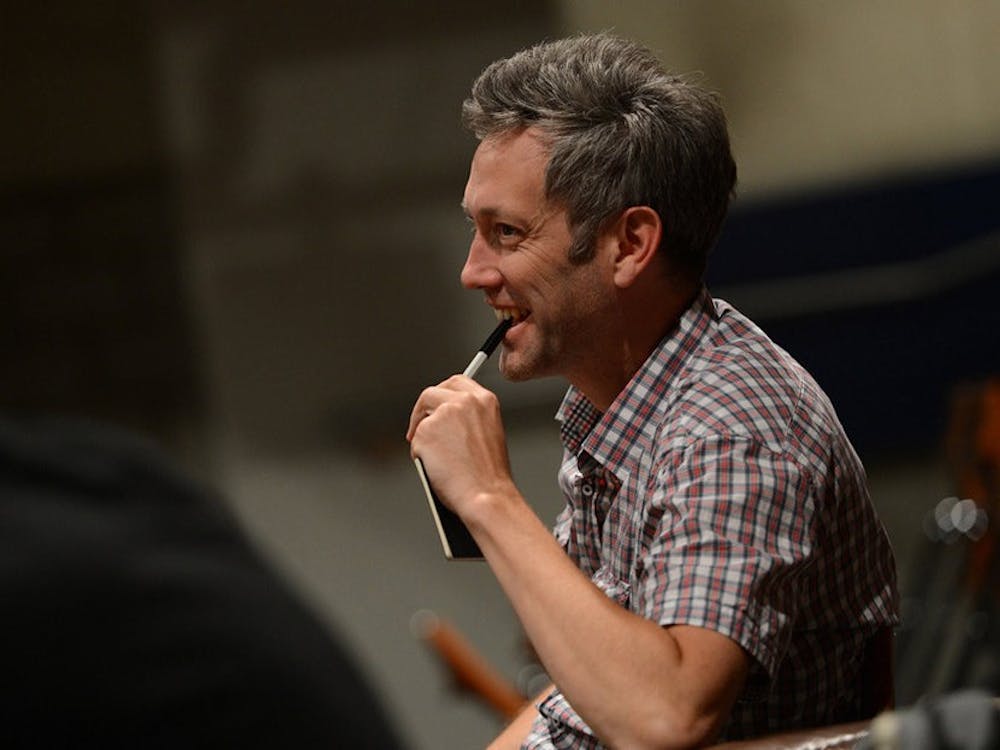Award-winning director and playwright Richard Maxwell presented “Enhanced” with a student cast at the Rubenstein Art Center’s gallery on Thursday, Feb. 13. Maxwell is internationally renowned for his work and founded the experimental production company, New York City Players. He has created 18 full-length plays and written an advice book titled “Theatre for Beginners.” In “Enhanced,” Maxwell partnered with Duke Theater Studies to reveal the complexities of institutional culture and human nature.
Theater professor Jody McAuliffe recommended a small group of students to participate in the play. After only 10 days of rehearsing, the four-person cast presented a 25-minute show as staff members of a restaurant. In this one-night-only performance, audience members walked into a staged Applebee’s, complete with bar-wiping, table-setting actors clad in the typical all-black attire of restaurant employees.
As the play continued, this casual restaurant scene shifted to a dramatic disclosure of each character’s hidden identities. The fluorescent lights dimmed and each performer froze in a stoic stance. A recorded voice-over revealed each individual’s conflicting thoughts, worries and vices. Jade, for example, was a kind, empathetic thief; Frank, a charitable vandal. As their secrets became more evident and more intense, each person remained still, preparing to battle the intimidating duality of their psyche. By explicitly describing the shocking contrasts of each person, “Enhanced” directly confronts the overlooked multi-faceted nature of all people.
When the lights came back on, their secrets remained hidden. Hiding crucial parts of their identities, though, diminished the amiability between the restaurant employees. Arguments and miscommunication created tensions that erupted into chaos. Blaring security alarms and shattered plates captured the unpredictability of true fights. Such improvisational elements illustrated Maxwell’s flexibility and eagerness to incorporate the performers’ ideas into the show.
“Working with Richard Maxwell was a great experience,” sophomore Seth Rosen said. “He wrote the play as the rehearsals progressed and it was very interesting to see the play change and adapt to his vision.”
The play’s final monologue discussed the value of dynamic social and emotional dimensions in one time and place: “There is liminal space in getting from this space we made to the space that was already here. And so we can, we will, explore what that liminal space might signify… what it means to get to this other space, right here.”
What I found to be the most intriguing part of this performance, however, was not the acting or the plot or even the seemingly interactive set design; it was the audience’s reaction to the play. Being a work-in-progress showing, many lines were stiff, monotone and awkward. Actors forgot lines, stage directions and would blatantly read lines directly off the script. People in the audience giggled and exchanged confused looks during these uncomfortable moments, wondering whether these blunders were intentional, or whether they were just part of the show’s message.
Yet these mistakes didn’t ruin the viewing experience. As the performers and audience members filed out of the Ruby, actors’ friends playfully cracked jokes about quirky moments. Peers congratulated each other on their work. Everyone celebrated the beauty of student involvement and experimentation. The show ended, but the laughing, clapping and hugging had only begun.
“I didn’t have much acting experience going into the play and I definitely learned a lot,” Rosen said. “I did not know any of my fellow performers initially, but through team building and acting exercises led by Richard [Maxwell], I became friends with the cast which strengthened our relationship on and off stage.”
Audience members are quick to judge artists based solely on their art. Which, from a critic’s perspective, is automatically the right thing to do; personal stories can cloud objective opinions. But art is personal. It’s not necessary to find objectivity in forms based on self-expression and intimate experiences.
From a student’s perspective, art is not only about the work itself but about supporting friends and peers involved in its creative process. Art is about learning, growing and living, and we can’t learn without mistakes. We can’t grow without our friends laughing about those mistakes. And we can’t live without support — for our art and for each other.
Get The Chronicle straight to your inbox
Signup for our weekly newsletter. Cancel at any time.

